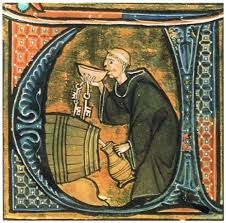History is a serious business, in the main. We look at documents, chronicles, diaries, in order to analyse reigns, policies, wars, social deprivation...
Sometimes though, history - specifically that recorded by monks - can make us chuckle. Reading the Anglo-Saxon Chronicle, which I do on a regular basis, I never fail to smile when I see the entry for the year 776. It tells of a battle fought at Otford, but it doesn't say who won, and it also informs us that "marvellous adders were seen in Sussex."
Later on in the pre-Conquest period, in 1058, the earl of Mercia, Ælfgar, was banished for a second time. He wasn't away for long, returning as he had after his first banishment with the help of the Welsh. This time though he also had a Norwegian fleet with him, commanded by Harald Hardrada, but we don't know if this was a planned invasion, or just an attempt to restore Ælfgar to his earldom in Mercia, because as this point the Chronicle says that it was all "too tedious to relate."
It kind of skews the image of monks, with heads bent over their writing desks, diligently expending their best efforts in the pursuit of accurate recording of events. And in that vein, I am grateful to the Anglandicus blog for bringing to my attention the case of the Irish monk with an almighty hangover. A ninth-century copy of a Latin Grammar has a marginal gloss in Ogham script which apparently translates as Latheirt and has been defined thus: "Ale [Lait] + killed [ort], i.e. ale has killed us, that is ale drinking." So it would seem that the monk was hampered in his endeavours by a hangover.
It gets worse...
I'm currently writing the follow-up to my novel, Cometh the Hour, and as I always do, I checked my reference books for details about the Anglo-Saxon way of life. I was thrown a little off-topic though when I came across a reference to a particular craftsman, cited for having advanced through his abilities. This man had made a name for himself as a craftsman, specifically a metal-worker, and had risen from being a monk, to an abbot and then a bishop. "It was at this stage he disappeared, as did the gold and jewels provided to make a new crown for the king (Edward the Confessor) and the bishop’s treasury."[1]
Well, I had to find out more...
The man in question was called Spearhafoc (Sparrowhawk), and this might have been a nickname, referring to the sharp eyes he'd need for his metal work. He began his career as a monk at Bury St Edmonds, but in around 1047 he was appointed abbot of Abingdon by King Edward the Confessor. There's a suggestion in the chronicle of that abbey that some bribery might have been involved, but by fair means or otherwise, he was made bishop of London in 1051.
There was a bit of a hitch, however. Robert of Jumièges, the recently appointed archbishop of Canterbury, when presented with the king's writ and seal which made clear that Spearhafoc should be consecrated as bishop of London, stated that this had been forbidden by the pope.
After trying a second time to persuade the archbishop and having again been refused, Spearhafoc simply went back to London and squatted there with, apparently, the king's full permission, "all that summer and autumn." [2]
But 1051 was quite a tumultuous year, which saw the banishment of the powerful Godwine family with whom Spearhafoc seems to have allied, and we are told that straight away after he'd exiled them, the king expelled Spearhafoc from the bishopric of London and Spearhafoc was never heard of again.
Sounds like a straightforward case of politics, bickering, and clashes of interest. Certainly, Goscelin of St Bertin, an eleventh-century Benedictine chronicler, extolled Spearhafoc's skills in goldsmithing. The Abingdon Chronicle also mentioned that he was marvellous at working gold and silver. So it does seem as if these talents helped propel him to high office and yes, craftsmen could advance. However, the Abingdon Chronicle also mentions that when Spearhafoc left London, he took with him a store of gold and gems which the king had given him to make an imperial crown [3] and it appears he also took valuables from the diocesan stores.
As historian John Blair has said, there seems very little other than Spearhafoc's skills as a craftsman that might have recommended him to the king, and I can just imagine him, thwarted, frustrated and under orders to quit the country, deciding to take with him whatever he could stuff into his bags.
None of these stories helps my research, but I do enjoy them, and they are a reminder that even monks' patience can sometimes snap!
 |
| My own photo of a visiting Sparrowhawk |
[1] Anglo-Saxon Crafts - Kevin Leahy p 172.
[2] ASC (C-F) 1042-1087 E 1048 (1051)




Spearhafoc is a great name. Could apply to other professions too.
ReplyDeleteIt's great, isn't it?!
DeleteUrsula K. Leguin used it in her Earthsea Trilogy for the main character.
DeleteYes she did - I had forgotten that! :-)
Delete'Wicked' :)
ReplyDeleteGreat post!
ReplyDeleteThanks Anna!
DeleteLove this post, Annie. This is the kind of story that makes history for me – the 'did you know?' titbits. Wonderful! I wonder if old Sparrowhawk got away with his booty? Wouldn't it be great to know?
ReplyDeleteThanks so much - glad you enjoyed it :-) I like to think of him doing the medieval equivalent of sunning himself on some sunny resort somewhere, and sipping champagne on a yacht!
Delete